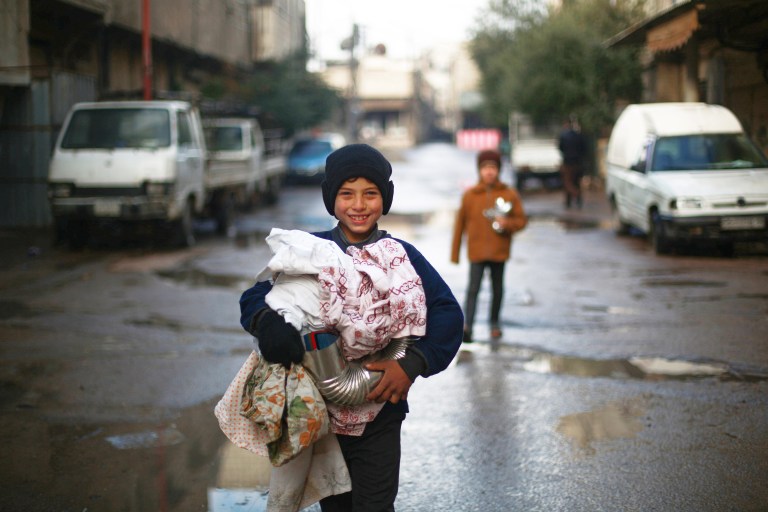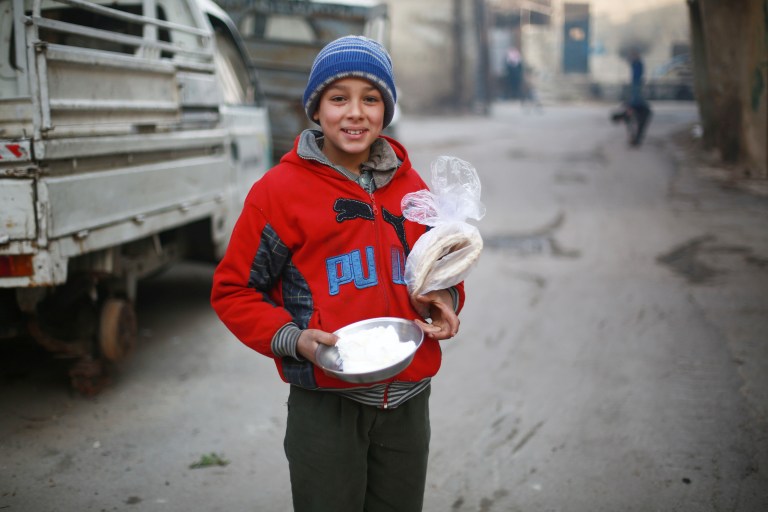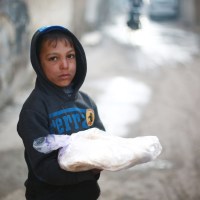 Ali was so proud of his success, his face was shining!
Ali was so proud of his success, his face was shining!
“I asked my mom if she had cooked anything today. I wasn’t expecting her to say yes, but I still had hope in my heart that she would.”
Ali has grown used to going without food. He is growing up in a part of Syria where years of war has made food scarce.
“‘No,” his mom replied. “But this time it’s because we are out of firewood, and the fireplace exhaust joint is worn out and leaking smoke.”
There is no electricity in their city. The cost of cooking fuel is so expensive for their family, they couldn’t buy it even if they could find it. Ali’s mom, a widow, does the best she can to take care of her children in unimaginable circumstances.
“She gave me some money and asked me to go bring some firewood and a replacement piece for the exhaust [pipe]. I knew the money my mom gave isn’t nearly enough to buy both, so I asked the shop’s owner if he would give me the exhaust now and I’ll pay for it later, and he did agree. Honestly, I knew he would because he knew my late father. Then I found a man who is selling old cloth for cheaper than firewood. I bought some. Now my mom can finally cook us something.”
Still a boy, Ali knows the price of stove pipes and firewood off the top of his head like our kids might know the price of toys and candy. He negotiates credit. He sources the cheapest cooking fuel he can find so his family can eat. He left the house knowing that eating a meal that day was riding on him.
Kids are resilient, right?
||

“I think the world will never understand what it’s like to live [here]. They hear about the siege, and the constant bombardment, but they can’t imagine what it’s like to live through this every day.
“My younger brother and I are thinking about working to help our father—who lost his arm and leg—just to be able to afford bread.
“We don’t think about other stuff, like playing or having fun. All we think about is how to survive.”
Ahmed is 10 years old. He carries the weight of the world on his shoulders.
||

Mohammed carefully carried a dish of soft white cheese in his right hand, while a bag of fresh flat bread was tucked under his left arm. He was so excited!
“My father called me to the kitchen this morning.” His father tucked a dollar into his hand, but before he had a chance to speak, Mohammed spied the beginnings of breakfast spread out on the kitchen table—a plate of dried herbs, a bowl of water (instead of the traditional oil), and a kettle of hot water.
“I jumped with excitement! ‘This money is for cheese, right?’”
“‘No,’ his father answered, clearly frustrated. “It’s for three pieces of bread. If we buy cheese we won’t have enough money for bread, dear.”
Mohammed took the money and ran to the corner store near his house. On his way, he bumped into a friend who had a bag of bread tucked under his arm. Mohammed saw the little stamped card his friend carried, immediately realized that an organization in the area was distributing bread, and asked where he got it. In no time Mohammed was in line to get bread for his family too!
Which meant that the dollar his father gave him could buy cheese. What a fantastic morning!
||
Ali, Ahmed and Mohammed each brought home bread for their families last month, thanks to you. At dozens of our distribution centers dotted across the city—spread out to reduce the crowd size and the chance of being bombed—families come to get enough bread to last for two days.
For some families, it is the only food they will have. And sometimes when children come for the bread, they can’t wait until they get home to have the first bite.

Wherever war forces children to grow up far too fast and carry the suffering of their families, this is where we are called to show up.
From Syria to Iraq, you are standing with these children, putting food into their hands, and sharing hope in the midst of chaos.


